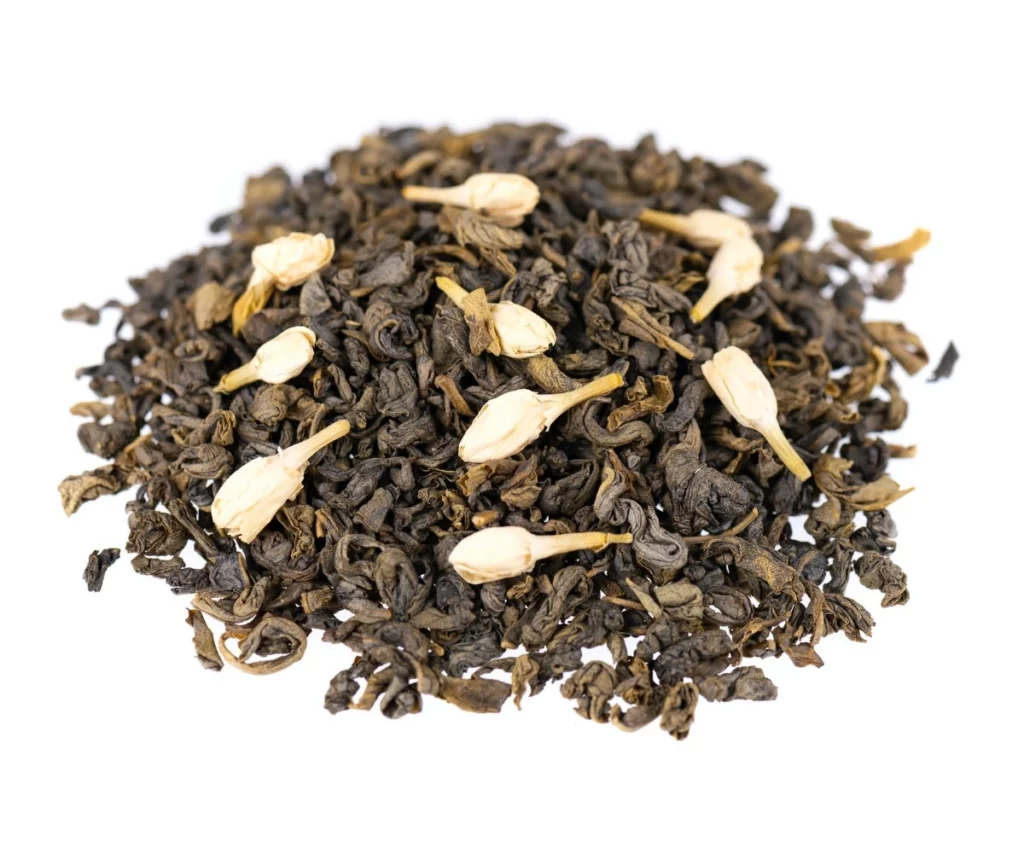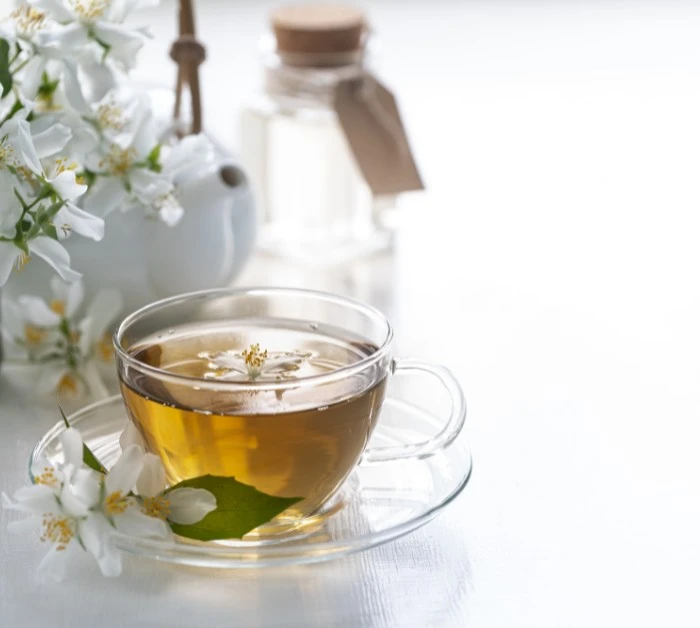Jasmine tea is one of the most popular teas today, thanks to its distinct floral flavor. This tea is not only delicious, but it is also good for your health!
In this post, we will discuss the research-backed benefits of drinking jasmine tea, as well as the potential side effects. You can also learn how to properly brew jasmine tea in order to preserve the aroma and enjoy a beautiful cup of jasmine tea.
But first, let’s get the basics straight: what exactly is jasmine tea?
This post may contain affiliate links, which means we may receive a small commission, at no cost to you, if you make a purchase through a link. For more information, please see our disclosure.
What Is Jasmine Tea?
The name “jasmine tea” typically refers to scented, blended, or flavored green tea. Jasmine tea is made from a combination of true tea leaves and jasmine blossoms. It is traditionally made with green tea, however black or white tea can also be used.
Since flowers are used to enhance a true tea, most jasmine teas are classified as flavored or scented teas.
The scenting method involves drying tea leaves with fresh jasmine flowers. The flowers are replaced every 24 hours, and the procedure can take a few days depending on the desired combination. The blossoms can be utilized for making green jasmine tea or to flavor other true teas like oolong and black tea.
While the traditional method of scenting jasmine tea is the most natural, it is also the most time-consuming. As a result, the tea industry has created more competitive methods of infusing the coveted jasmine flavor into tea. Commercially available scented jasmine teas may be prepared with jasmine oils or natural jasmine flavors.
Fresh jasmine flower buds are used to make higher-quality, more expensive jasmine tea. Jasmine extract is used to make the less expensive and more affordable jasmine tea.

What is the taste of Jasmine Tea?
Many factors affect how a jasmine tea tastes, including the tea base (green, white, or black), where the tea leaves and jasmine blossoms were grown, the method used to scent the tea, and how the final cup of tea was brewed.
Nonetheless, it is frequently described as having a soothing, light, floral, and clean but somewhat perfumed taste.
Other traits used to describe the overall flavor profile include: fresh, blossomed, sweet, dewy, fragrant, delicate, and subtle.
What is Jasmine Tea good for?
The majority of the magic in jasmine tea comes from its green tea base, which gives many of the same tremendous health benefits as drinking green tea.
Here are the primary research-backed reasons why drinking jasmine tea is good for you.
High in antioxidants
The high content of antioxidants in this delicate and tasty beverage is perhaps the most acclaimed attribute of jasmine tea. Although green tea is the most commonly used base flavor for jasmine tea, different antioxidant properties can be obtained depending on which variety of tea is used as a basis.
For example, black tea has high levels of theaflavins while green tea has high levels of catechins.
Catechins are the antioxidants that most jasmine tea drinkers seek since they are essential in preventing certain serious ailments in the body.
Epigallocatechin gallate (EGCG), a highly powerful catechin in green tea, has been linked to a variety of health benefits, including weight loss and better blood sugar control, as well as heart and oral health.
Weight loss aid
While there is no magical elixir for weight loss, jasmine green tea can be a helpful addition.
Because it contains green tea leaves, jasmine tea has been demonstrated to help with weight loss by increasing metabolism.
According to a review of several studies, green tea, the most popular base for jasmine tea, may enhance your metabolism by 4-5% and fat burning by 10-16%. While 4-5% may appear insignificant, it could result in an additional 70-100 calories burned per day.
Jasmine tea is a naturally low-calorie beverage, so you may enjoy it without worrying about putting on weight. Adding honey or sugar to your tea might increase the number of calories, so use carefully.
Can lift energy and focus
In addition to polyphenols, jasmine and green tea contain the amino acid L-theanine, which has a good effect on cognitive health, including the capacity to improve alertness without causing “jitters” as certain stimulants do.
This tea also contains caffeine, which can help with concentration and motivation.
The combination of L-theanine and caffeine may help you stay more alert and vigilant. Furthermore, it may help with short-term memory.
May improve heart health
According to research published in the Journal of Nutrition, the catechins in jasmine tea prevent LDL (bad) cholesterol from oxidizing, which increases your risk of heart disease.
Because the catechins in this tea inhibit the oxidizing process, blood pressure and cholesterol levels decrease, and long-term concerns such as heart disease can be prevented.
May help relieve stress
Jasmine tea is unusual in that it has both energizing and relaxing properties. The presence of the compound linalool is assumed to be responsible for the floral, relaxing aroma of the flower petals.
According to studies, the olfactory senses are strongly linked to relaxation. When you inhale the delicious aroma of a freshly made cup of jasmine tea, you activate a parasympathetic response, releasing chemicals that assist your body to calm and relax.
Because it helps your body and mind relax, this tea may help lower your heart rate and reduce muscle tension.
Jasmine tea may even stimulate the release of GABA, a “feel good” inhibitory neurotransmitter that puts you into a relaxed and attentive state. The L-theanine in this tea also promotes a healthy stress response, leading to increased relaxation.
May lower your risk of type 2 diabetes
As previously said, jasmine tea made from green tea contains the compound EGCG, which may assist your body in using insulin more effectively and lowering blood sugar levels.
According to a study published in the journal BMC Pharmacology, antioxidants found in green tea leaves reduced blood glucose levels in diabetic mice. This shows promise for people who experience blood sugar spikes or lows throughout the day.
More research on human populations is required to confirm these positive effects.
Good for oral health
Jasmine tea is primarily based on green tea, which is high in catechins. Catechins are a type of polyphenol that may help prevent tooth decay – or cavities – by destroying plaque-forming bacteria.
When applied to the teeth, a solution containing green tea catechins inhibited bacteria from creating acid, according to a 2006 caries study. Too much acid might destroy your teeth’ enamel.
Furthermore, some research suggests that jasmine tea may help to improve bad breath by reducing odor-causing bacteria.
Potential side effects of Jasmine Tea
Jasmine tea is delicate and aromatic, with a gentle and sweet floral taste. When drank in moderation, it is good for your health and has few to no side effects.
Due to its true tea base, it contains caffeine which may cause issues for some people.
Anxiety, sleeplessness, restlessness, irritability, jitters, and increased urination are among the side effects of ingesting too much caffeine. Green tea contains less caffeine than black tea base. So if you prefer to consume less caffeine choose jasmine tea with a green tea base.
Catechins in jasmine tea may limit your body’s ability to absorb iron from foods. If you consume too much jasmine tea you will increase your risk of iron deficiency. However, this only applies to people who consume an excessive amount of green tea, as well as people who are at risk of iron deficiency, such as pregnant women, young children, and people with dietary restrictions.
Jasmine tea is not recommended for pregnant women. It is best to avoid jasmine tea when pregnant or consult with a doctor before using it.
It is also advised not to consume jasmine tea on an empty stomach. To avoid stomach irritation caused by harmful chemicals and pesticides, always choose organic tea or high-quality tea.
How much caffeine does Jasmine Tea contain?
Because jasmine is combined with tea from the Camellia sinensis plant, which always includes some caffeine, jasmine tea contains caffeine naturally.
It has 15-60 mg of caffeine per cup (237ml) depending on how long the tea leaves steep and what type of tea is used as a base.
White tea has a low caffeine content, green tea has moderate caffeine content, and black tea has reasonably high caffeine content, roughly half that of a cup of coffee.
So, if you’re watching your caffeine intake, check the packaging carefully or ask your tea supplier directly for caffeine information related to the tea you’re buying.
How to brew Jasmine Tea properly
Ingredients
- 1 1/2 teaspoons jasmine loose tea
- 1 cup water
Instructions
Step 1 – Boil Water
To allow tastes to emerge correctly, jasmine tea should be brewed with pure or filtered water. Set an electric kettle with temperature settings to 175°F. If boiling water on the stovetop, let it come to simmer then turn off the heat.
Note* – When brewing jasmine tea, avoid using boiling hot water because it will turn the tea bitter.
Step 2 – Put jasmine tea into a teapot and add hot water
Step 3 – Steep
Jasmine tea is typically made using green tea, which should be steeped for no more than 3 minutes. Brewing for an extended period of time will result in bitter tea.
Depending on how the tea was made, it should be steeped for 30 seconds to 3 minutes. Always read the steeping directions on the label of your purchased tea.
Step 4 – Strain jasmine tea leaves and put hot tea into a teacup
You can sweeten hot jasmine tea with sugar, honey, or date syrup. To avoid changing the flavor character of jasmine tea, most producers suggest avoiding sweeteners.
Finally, this delicious and healthy tea is simple to incorporate into your diet. Before including jasmine tea into your diet, make sure to consult with your doctor.
Although it is an extremely healthy tea, keep in mind the potential side effects, particularly the presence of caffeine.

Disclaimer: While we have looked into the research on the health benefits of this tea, this is only for informational purposes and should not be construed as medical advice. Those with health-related questions should seek the advice of a medical professional.




